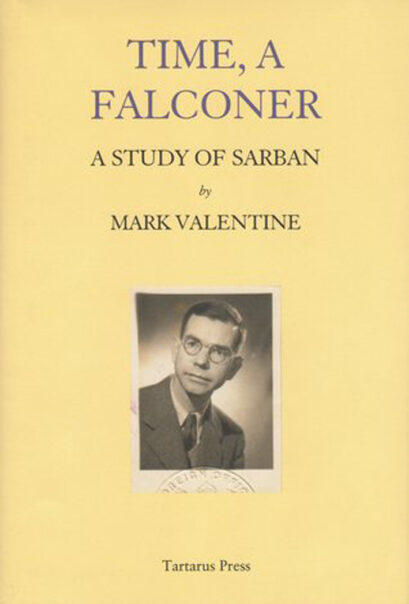 By MARK VALENTINE (Tartarus Pres; 2010/23)
By MARK VALENTINE (Tartarus Pres; 2010/23)
England’s John W. Wall, a.k.a. Sarban, was a little-known master of the macabre. His output was pretty limited, consisting of the anthologies RINGSTONES AND OTHER CURIOUS TALES (1951) and THE DOLL MAKER AND OTHER TALES OF THE UNCANNY (1953), and the 1952 novella THE SOUND OF HIS HORN (in addition to a handful of posthumously published work), all published by Peter Davies. Those three books, however, are among the most powerful and enduring horror fiction of the 20th Century, particularly THE SOUND OF HIS HORN, which ranks as one of the most horrific and imaginative “If-the-Nazis-won-WWII” narratives in existence.
TIME, A FALCONER is the first and only book devoted to Sarban’s life and literary output. It’s short, which makes sense in light of the scantiness of its subject’s oeuvre, but author Mark Valentine (an accomplished horror scribe himself) delivers a satisfying overview of all things Sarban. Much of what Valentine provides is hearsay, as Sarban remains an enigmatic figure; his sexual proclivities, for instance, are unknown, although given the sadomasochistic doings detailed in his fiction it’s fair to conclude, as Valentine does, that he had a penchant for the perverse.
Sarban grew up in an impoverished Yorkshire community and attended Cambridge University on a scholarship. Much of his adulthood was spent in the Diplomatic Service, which took him to various exotic locales before a return to England in the late 1960s. Sarban’s final years, in which he “found himself without a life-partner, without a home, and with a job he did not want,” were lonely ones. His sole comfort in that bleak period, according to Valentine, was his correspondence with fans of his fiction, which included prestigious names like Mike Ashley, Brian Stableford and Richard Dalby.
A multi-year diary kept by Sarban helps Valentine fill in his subject’s (admittedly not always exciting) exploits. Also provided are publication histories of Sarban’s three books, as well as detailed synopses and critiques of his unpublished novels PAUL WENZEL and THE GYNARCHS, and posthumously published collection THE SACRIFICE (2002).
Readers without a rooting interest in Sarban probably won’t get much out of this book, but for those who value his work it’s a must. In fact, I’d say that for a full understanding of THE SOUND OF HIS HORN, RINGSTONES or THE DOLL MAKER a reading of TIME, A FALCONER is essential.
